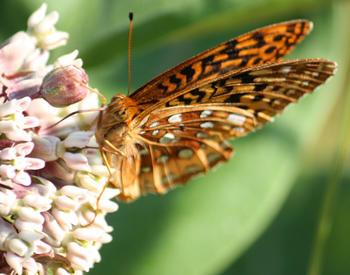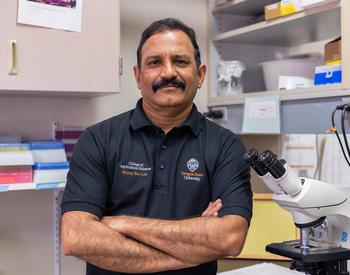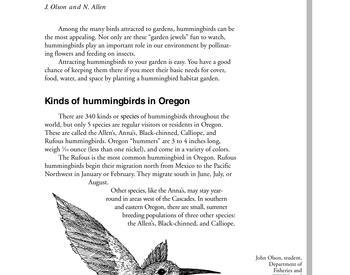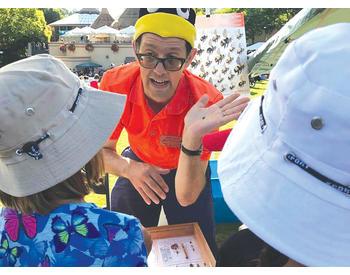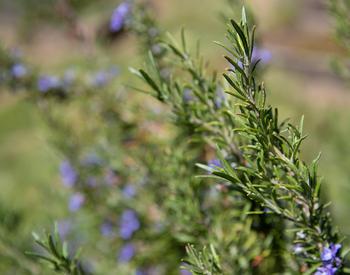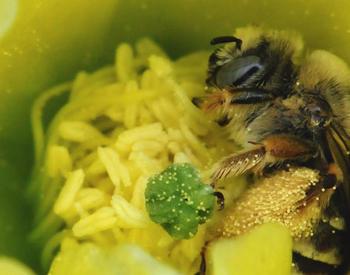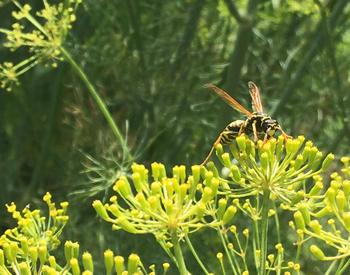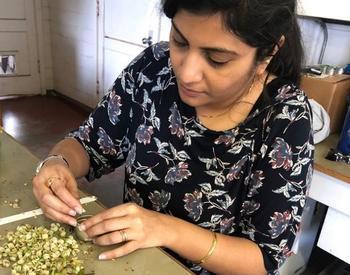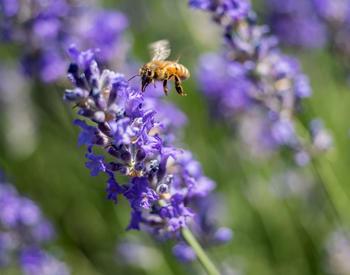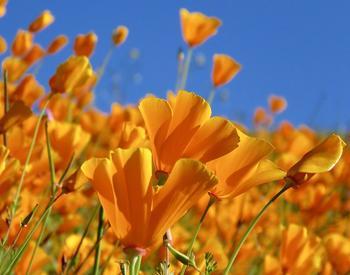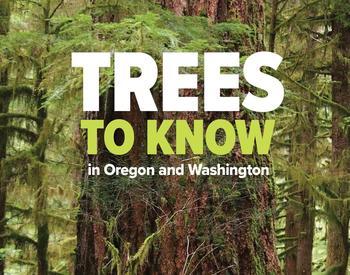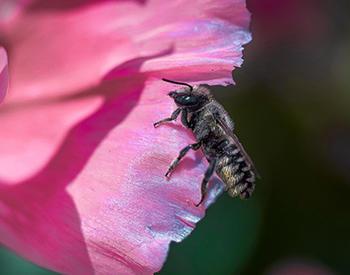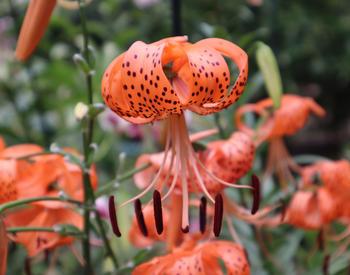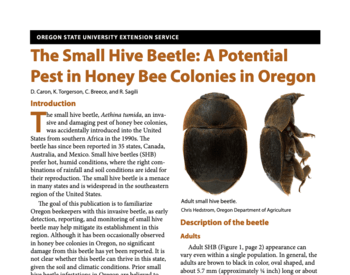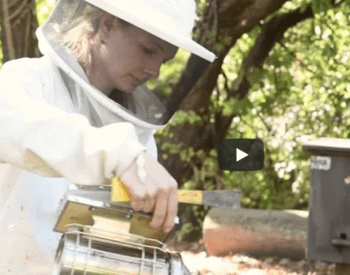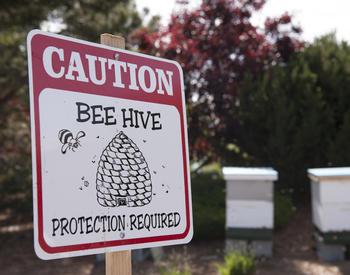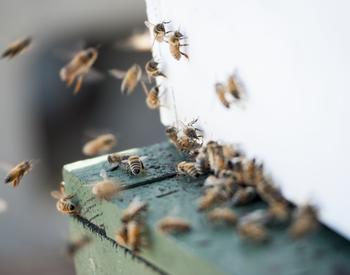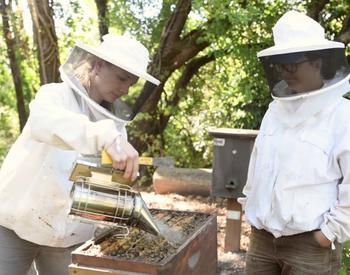Transcript
[00:00:00] Andony Melathopoulos: The cooperative extension service across the United States is a remarkable resource on pollinator health. Thinking about the various aspects in which extension has this influence anywhere from someone like myself, a extension specialist focusing on pollinator health, but you can think of the master gardeners.
[00:00:18] Many states have master beekeeper programs. Even some of the specific crop specialists, take the Berry crop specialists. We had Lisa D Vetter on a previous episode, also providing a lot of really timely advice on pollinator. I'm always excited when I learn of a new specific pollinator health extension position.
[00:00:36] And this week we have Laura Johnson. She's the university of Vermont's brand new extension pollinator support specialist. And in this episode, we're going to hear a little bit about our program. And also we're going to take the trip up to cold snowy, Vermont, and hear about some of the pollinator health specific issues for Vermont and how the position came about.
[00:00:56] So this week, I'm taking pollination up to the Northeast. We're going to be talking with Laura Johnson on pollination. Laura welcomes, pollination.
[00:01:06] Laura Johnson: Thank you for having me.
[00:01:08] Andony Melathopoulos: I'm so glad to have you here. It's it's so exciting to hear. I always love hearing about new extension positions and pollinator health, and there's a new position now in Vermont that since July you've been you're the you're leading.
[00:01:22] And, we had a brief conversation before this and there's a lot of extension positions in pollinator health that are focused on AICPA culture. And tell us about, your new position and how it might differ from a traditional AP culture position.
[00:01:37] Laura Johnson: My title officially is pollinators support specialists. My position I think is more broadly focused. So it includes thinking about all pollinators and farm systems and in agriculture and recognizing. Wild pollinator species and bee species in addition to manage pollinators like honeybees.
[00:02:05] So I feel yeah, my position is a little bit more broad and focuses more on the wild. Community, but also recognizes the importance of those managed piece as well, and pollination services, decision making on farms.
[00:02:21] Andony Melathopoulos: And I suppose those two things came together because of some unique issues in Vermont are around pollinator health and, Yeah.
[00:02:27] How both of these, both kind of groups, both native and honeybees are contributing to pollination. Can you tell us a little bit about the what's the snapshot of what Vermont looks like when it comes to pollinator health and some of the concerns out there?
[00:02:41] Laura Johnson: Yeah. Vermont is a really small state and it's been interesting for me in this position because.
[00:02:49] We are Vermont. Our culture is very connected to agriculture and we really pride ourselves on a lot of different types of agriculture. Despite the fact that our landscape. Compared to other parts of the United States is not that great.
[00:03:04] It's really pretty Rocky in some cards it's like really heavy clay and other parts. A lot of hillsides that aren't great for or running your tractor across and but pretty small scale in terms of the bag, but And it and because of that also, it's a unique landscape and that we have a lot of opportunity for habitat for things outside of agriculture, like wildlife.
[00:03:32] And for me thinking about pollinators and so coming into this position I was what is insect? The Klein and Vermont, what is pollinator decline in Vermont? Is it really concerned? Because when I look outside, I see all these, feel the edges really heavily, populated with what could be potential on their habitat.
[00:03:53] But the reality is like, As a state, we are not immune to the declines that we're seeing across the nation. Then I frost the world. There are still in particular bumblebees that are highlighted in the research. There's three that are listed as endangered or threatened, and one's about to be added.
[00:04:19] And. And the growers in our state are, definitely aware, especially the fruit tree, fruit and blueberry and Bramble growers who go out and they really depend on these volunteer services. Seeing fluctuations of these pollinators in their crops. Whether or not that's decline or just shifts in communities that naturally happen every year.
[00:04:44] And it's a question, but in Vermont, despite our landscape, we still do experience this threat that, the rest of the world is also experiencing. But I think it's also because of our small scale agriculture that we have here. We have a lot of opportunity, I think, to just continue to enhance and cultivate habitat for wild pollinators and pollination services in managed landscapes.
[00:05:10] And several native Vermont species are closely associated with flowers, have cultivated plants on these farms. It, it may even mean that we have an opportunity to create more abundance and of pollinators and those managed landscapes, some intentional strategizing on how to do
[00:05:30] Andony Melathopoulos: that.
[00:05:30] When I think of the Northeast, I think, I think I've a tree fruit, especially apples, but I at the break we were talking that there is a sizeable, a high Bush blueberry. There's no low Bush in Vermont.
[00:05:43] Laura Johnson: No, not that I have yet to see I, there may be, I just haven't yet seen a producer, but mostly it's high Bush blueberries.
[00:05:52] And yes, there are quite a few growers here in the seat growing
[00:05:59] Andony Melathopoulos: in terms of crop output that might depend on some of the. Native bees. That's one, I imagine there's a close association with bumblebees and blueberries as they're able to sauna Cate and get pollen out of those poor Seidel answers.
[00:06:13] But I know there's a, I remember working in low Bush, just across the line and new Brunswick and Nova Scotia with low Bush that, there's also many other species that can Sana Cate tax groups. It's not just bumblebees. There's. Ease that can do this, but maybe overlooked by the growers because they know bumblebees, but they don't know Adrena or something.
[00:06:31] Laura Johnson: Yeah. And that has been interesting to in talking with growers, I've been wondering about, how can we maybe decide on a sort of monitoring protocol in blueberries and Vermont? That works for growers in making these decisions around are there enough wild pollinators or do I need to think about the meeting?
[00:06:57] Some manage honeybees or bumblebees. And when I ask growers, how are you going out and monitoring now, it's often, I'm walking the lines of my blueberries and I'm listening. And Vivian bumblebees have that really distinct sound and whereas some other species may not. And so how do we think about and include the awareness of those other types of fees that might.
[00:07:27] Andony Melathopoulos: I love that idea of a grower being able to go up from year to year. I remember Frank Grumman in Maine had a kind of similar idea where there's a nice, easy tool where a grower can go out and say their three year average is this. And then they know I don't need to bring in more honeybees or I really have a great there's a great endowment of native bees in my area, and I may want to spend some money on augmenting the habitat.
[00:07:52] It really gives them a picture of what's visiting. That sounds like a great thing to do. And I guess it raises the question as you're really new. You've just, months into the job. What are you hoping to get done in addition to that in your first year, what your goal?
[00:08:06] was talking at the break when I first started. I really felt like there was so much to do it. It was a brand new position and it was overwhelming and, but I also remember some of the thoughts I had at the very beginning held true to me. I, they really weren't. They were right.
[00:08:19] But tell me where right now we'll catch up with you in five years to check on this, but what is what's on your priority list on your one?
[00:08:30] Laura Johnson: Yeah. I know I've been thinking a lot about this and what are the steps that I need to take to move forward and And I think first for me I been working in extension for a little while prior to this particular role that I'm in now.
[00:08:46] And most recently I was working in so health and water quality and cover cropping and nutrient management on farms and which has been really helpful as I approached this position because. I know, I have a, an awareness of sort of these ecological goals that farms are already striving towards.
[00:09:07] So I'm incorporating cover crops or minimal tillage or no-till depending on their system. If they're a vegetable farm in particular those are things that they might be increased. And so recognizing these other layers in fire management systems that could also provide resources to pollinators and B.
[00:09:33] Recognizing, climate resilience is really important to growers and growers are really great at growing cover crops and there's a lot of potential cover crops that could be. Instead of being terminating corporated, maybe exist, that's an additional resource for pollinators and encouraging fall native populations on farms.
[00:09:53] So I've been thinking a lot about those management practices and how to move forward. Yeah, adding that extra component of where to pollinators fit in. I think I'd like to start with, on your plantings and see where there's traction with that and particular thinking about cover crops and where farms are already at and using them.
[00:10:12] And where can maybe make some stress or for pollinators on the farms. And then also really it's just a continue to, do a needs assessments and prioritize based on that and listen, and stay flexible. And. And ultimately in, in this world, especially here in IBM, we are totally, grant funded, donor funded.
[00:10:41] So our programming is really heavily dependent on getting funding for this work. And so a lot of this initial work will be on and establishing that funding base in order to bring it to the field
[00:10:55] Andony Melathopoulos: and to growers. Yeah, extension, everybody knows what extension is, sometimes how it operates is a little page to people.
[00:11:04] And I guess the specialist position is in some ways supposed to be, we have extension I'm imagine in Vermont the same way extension office, and a county-based faculty. Who look to the specialist for guidance. So on cover cropping, and maybe a little tweet, just let you know, let the cover crop last a couple, two more weeks, and you really get this benefit for pollinators or something.
[00:11:25] That comes out. But I guess the other thing that people may not realize when a extension program gets up and running is there is this big focus on needs, assessment being able to go out to stakeholders. And that, that needs assessment is critical. When I go to a granting agency and they ask, why should we give you this money?
[00:11:43] And you say I've gone to stakeholders and they've identified these as the three major things they need to be able to do.
[00:11:52] Laura Johnson: Yeah, exactly. Yeah. And yeah, in Vermont extension UVM extension is unique. I think we're one of very few states that we don't have county government. And our extension offices are, throughout the state, but they aren't necessarily in per county.
[00:12:12] Our neighboring state New Hampshire does have counseling extensions. Yeah, it functions a little differently here in Vermont, but ultimately the goals are the
[00:12:21] Andony Melathopoulos: same. I will point out there's some Oregon counties that could put seven Vermont's in it.
[00:12:30] Laura Johnson: So we basically all work statewide it's feasible in our state.
[00:12:36] Andony Melathopoulos: I'm always curious because there has been. Some recent positions in pollinator health, this new trend in more broadly focused pollinator extensions positions. And I'm always curious about the circumstances behind those positions because they come about clearly, largely not through federal initiatives, but local needs that have been identified.
[00:12:57] Can you tell me a little bit about the circumstances that brought about the position in Vermont?
[00:13:04] Laura Johnson: Yeah. To my knowledge There in the beginning of the year in may, when blueberries are starting to flower and blossom, there was. No, there were observations being made by growers, around the state and the Vermont vegetable and Berry growers association has a really robust community and listserv that folks communicate on throughout the season or all year round.
[00:13:32] And so some of the folks who have blueberries on their farms put out this question to the listserv and to the group. About, are you seeing automobiles and your blueberries right now? Because I'm not. And or maybe I'm just seeing a few. This spring, there was this very lively conversation about what was going on.
[00:13:57] And and some local researchers and other extension specialists were brought into that conversation. Then there wasn't any grand conclusion about what was happening. There were some. Ideas around why. And one of those was that it was a little bit earlier of a spring.
[00:14:16] And so bumblebees were not quite out and about as much in population as they normally might be in another sprain at the time of flower blossoms. So there was this mismatch in weather and insect activity. May have been causing this, these observations by growers. And then also there were some other folks that went out and they may not have been noticing bumblebees, but they were noticing other types of wild bees that were a little more subtle in their character and pollinating.
[00:14:55] Yeah. Based on Dr. Taylor Ricketts, who works in the Dunn Institute and this house and the gun Institute of environment is doing a lot of research on pollination and based on his reaction to this communication he highlighted, annually and, over time there are these natural fluctuations.
[00:15:15] Fluctuations in insect populations. So it may just be that's not a great Bumble, we'll be near and it might be, some other the minor bees are out and they're doing the bulk of the pollination services. So there, there was, growers were asking like, do I need to buy in bumblebees?
[00:15:35] How many or is everything gonna be okay? That really sparked this need to maybe draw some more awareness about, what else is out there that we can be looking for in our crops. But I feel like my position also is. To collaborate with a lot of existing folks that are doing really good work in in pollinators and in agriculture and just helping to disseminate some of that information since specific to grower meetings.
[00:16:09] And and I think that's been something that's, been in the conversation for a while and this particular. Issue around blueberry pollination this spring just gain a push for the position to be created. So
[00:16:25] Andony Melathopoulos: that's really remarkable. It's a lot of these positions that come about come up, maybe urban concerns or broader public concerns is really interesting to see a position in pollinator health that comes at the prompting of of.
[00:16:40] Laura Johnson: Yeah, it's really exciting. And it's, for me, that's what inspires me to, hone in on the work that I have to do because I just have so much respect for farmers and and what they do for our food systems. And. I just hope that I can serve means that.
[00:17:04] Andony Melathopoulos: Fantastic. Let's take a quick break.
[00:17:05] Always loved doing the last segment of book recommendations with brand new faculty members. So this is a brand new faculty edition of your guest recommendation. So we'll be back in just one. Okay. We're back. So book recommendation, what does a pollinator health extension specialist?
[00:17:29] Laura Johnson: Yeah, beyond where these in your backyard, both that I think everybody turns to for identification. My book recommendation is actually a little more broadly focused, not specifically on pollinators, but I'm writing sweet grass by Robin welcomer. It's a really lovely book written by. She's a scientist, but also a citizen of a native American group in New York.
[00:17:59] And she really draws attention to recognizing ourselves as part of the natural world and not separate from it, which is something for me personally, seeing. It's student, but not something that I always remember. And which I think is it's important to remember that we are also part of this world and the decisions that we make impact everything else.
[00:18:26] And we are all, we're all part of the big wildlife web. It's not a specific pollinator book, but it just really helps to. It really helped me to realign my career and desire for what I do and what motivates
[00:18:44] Andony Melathopoulos: me, my best friend recommended that I read that book. I obviously now second recommendation.
[00:18:53] Okay. So that's the book recommendation. How about a go-to tool for somebody who's just starting. Oh,
[00:19:01] Laura Johnson: my gosh, all of my colleagues. I don't know if that's a cop out, but like everybody that yeah. Stakeholders, everybody that I've been working with, growers, other university specialists, entomologists that have been.
[00:19:16] Shouting about pollinators forever. And I already knows so much and have so much to share and I just really appreciate the resources that are out there in the community that I live in and and work in. But in terms of a hands-on tool so far, it's been my camera and.
[00:19:35] Taking pictures and going back and looking up, what be did I see today? And this farm and we're on this plant. So well,
[00:19:43] Andony Melathopoulos: Cameras I, I love taking pictures and it's always great. And then I always think of an extension as well. Those pictures you, you come to rely on, cause you're showing other people things, but I loved your first answer because it seems to me like people see an extension program and they see the person.
[00:19:59] Who's the specialist, it's clearly constituted by the stakeholders. Extension is so embedded in its practice, but also the other specialists and local agents that it is really a team approach. And I think that's the power of operative extension.
[00:20:18] Laura Johnson: Yes.
[00:20:21] Andony Melathopoulos: Okay that brings us to just to throw you on the hot seat now, like throwing this question, it was like, I just, we had a podcast with a honeybee person.
[00:20:31] Who's, favorite pollinator species was a bird, shockingly, but I'm curious about you. So do you have a favorite pollinator species? The.
[00:20:39] Laura Johnson: It's interesting. So I, myself, my backgrounds with, pollinators as a honey beekeeper and I very small scale, keep B, keep honeybees. So a little bit of honey here and there.
[00:20:52] But I would say the pollen either that I wanted to mention today is the jets I E which I is the name that I learned for it when I was in the peace Corps in para Y it's a small stainless speed and different parts of south America, central America. Beekeepers do peep, this the speed and were at for honey.
[00:21:18] And the claim is that the honey has a lot of really important medicinal properties to it that are different than, European honeybee, honey. So I had to look up what the name, the scientific name was. Cause I never really knew it or learned it. And I'm going to butcher it, but it's a Tetris Miska and boosts doula, but it's very small B stingless.
[00:21:48] And when I was down in Perry, Y I was lucky enough to be living in a community with a lot of subsistence farmers. And some of those farmers were also beekeepers and bees down. There are honeybees are the Africanized. Working with honeybees and pair. Why was definitely got stung a lot, which is tolerable, but not the most fun as compared to working with honeybees and here in Vermont or the Northeast.
[00:22:17] So when I learned of this other stingless bee, I was just, I couldn't believe it. And I just thought it was the greatest thing.
[00:22:27] I'm
[00:22:27] Andony Melathopoulos: always surprised. I've seen them before. I've seen various species. There's a lot of diversity, but they're tiny little things there. Yeah.
[00:22:37] Laura Johnson: Yes. They're very tiny. And and so I don't know if I would say it's my favorite B, but it's definitely like the first. Bee species beyond honeybees that I was introduced to and, or the European honey bee that I was introduced to.
[00:22:55] And I just thought it was the coolest thing.
[00:22:57] Andony Melathopoulos: So fantastic. We will have you back in five years. Or sooner hopefully, and we will see how this changes, but thank you so much for taking the time. We're very excited about your new program and wishing you all the best up there in Vermont.
[00:23:11] Stay warm.
[00:23:14] Laura Johnson: Yeah. Thank you. Yeah.
This week we head to Vermont to hear about the brand new pollinator health position.
Laura Johnson is Vermont’s Pollinator Support Specialist. She has a bachelor's degree in environmental studies from St. Lawrence University and a master's degree in horticulture from New Mexico State University. She is also am a Certified Crop Advisor and beekeeper and holds a Vermont pesticide applicator license. For more than two years, she also served as an agriculture extension volunteer in the Peace Corps in Paraguay, where she first started working with honey beekeeping. She is not new to Extension, having started with the Migrant Education program in 2017 before moving to an agronomy outreach role with the UVM Extension Center for Sustainable Agriculture. In this role, she will collaborate with existing University of Vermont programs and statewide and regional partners to promote best practices for pollinator health in agriculture. This effort will collect and disseminate practical information for farmers while also addressing information gaps through on-farm research. The focus will be on supporting the well-being of pollinators in the context of other farm health goals, such as integrated pest management, soil and water quality and climate change resilience.
Links Mentioned: University Vermont Pollinator Extension Program
